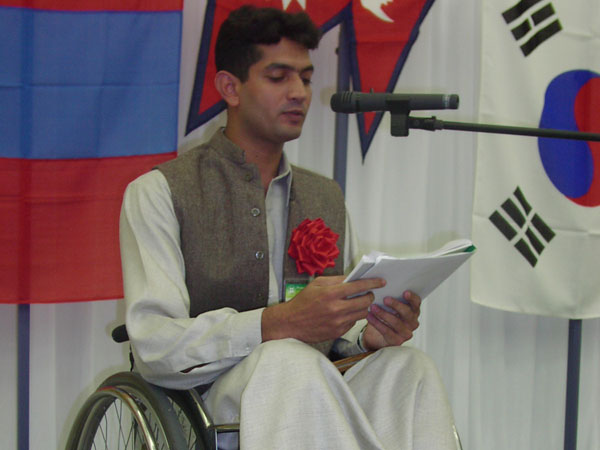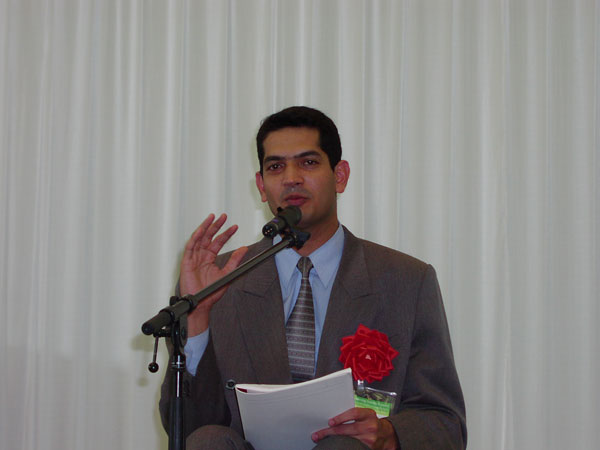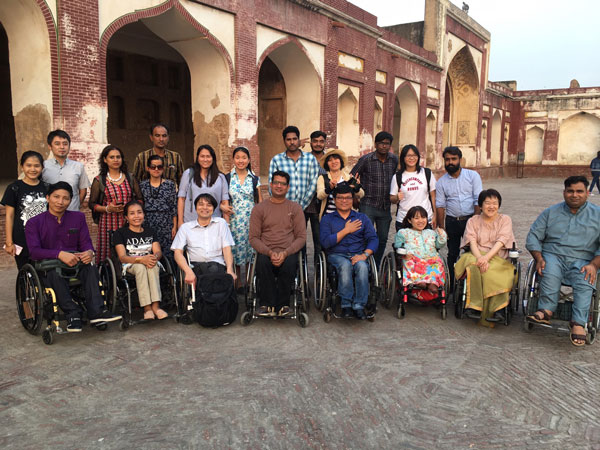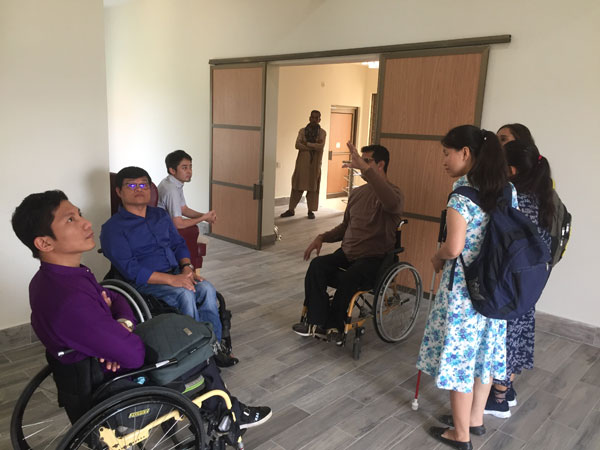
- Mr. Shafiq-ur-Rehman [Pakistan, Physical Disability]
- President, Milestone
Duskin Leadership Training in Japan 3rd trainee
- Shafiq/ Good day everyone. I am Shafiq Ur Rehman from Pakistan. In 1977, as a six-month old infant, I contracted polio. My mother used to carry me with my heavy braces in search of a proper hospital to find a physiotherapist. I experienced my childhood as a punishment because there were no good hospitals and physiotherapy centers to guide my mother on how to deal with my problem. Furthermore, my parents experienced a considerable amount of discrimination from relatives and those in our neighborhood. Some thought my parents must have made a mistake for me to suffer a disability. My story is common throughout various cultures worldwide.
- During the first ten years of my life, I was not treated like a normal child but a patient or special needs child. Therefore, I attended a special needs school with others who suffered disabilities during the initial eight years of my schooling. In 1992 or 1993, my fellow students and I decided to start an organization. This was probably the first organization in the world that was formed by 14-, 15-, and 16-year olds with disabilities. This is the romantic story of the start of a movement in Pakistan. We were the first cross-disability organization in Pakistan and we attempted to motivate our fellows not to give up and compromise our dreams, but rather to fight for our rights even though we were uncertain of these at the time. As teenagers we had a limited source of information and knowledge. Education merely afforded us curiosity to discover the reality, differences, and solutions to our life problems.

Coming to Japan as Duskin trainee
Doing presentation during the program in Japan
- Subsequently, I attended the Duskin Leadership Training in Japan in 2001, which changed my life as well as those of many in Pakistan. This was the turning point in the disability movement in Pakistan because of the support from various independent living centers in Japan, including Human Care Association, Mainstream Association, PARTNER Center, and MUCHU Center. These centers helped us to realize that we are not alone in the world, but rather we have a common agenda to discover the real reason we are alive. Duskin Leadership Training afforded me the opportunity to consider that regardless of culture, lifestyle, economic background, and race, people with disabilities suffer discrimination. That is the foundation of the universal disability movement. I have learned so much from my fellow students, my mentor, Ms. Masako Okuhira, my teachers, Mr. Shunji Kadota and Mr. Shoji Nakanishi, and many friends, especially Mr. Sato. I have a long list of my friends who taught me to think in a diverse manner and employ different ways to discover solutions. This was the process used in Duskin Leadership Training. I will always remember the words of my mentor, Ms. Masako Okuhira, who advised, "Shafiq be yourself." Being yourself is the art of living. The secret of living involves loving ourselves, taking responsibility for ourselves, and assuming responsibility for our work. It is the secret of the vision of our mission. When I finished my leadership training program in Japan, I developed good relations with the independent living centers in Japan, in particular, Mainstream Association who have supported us. PARTNER and MUCHU centers invite people with disabilities from Pakistan to spend some time in independent living centers in Japan. Consequently, I have introduced many of my friends from Pakistan to visit Japan and learn from their system and culture. When I returned from Japan, although I had dreams, nobody was ready to understand these. Because it was difficult to explain these, I have shared my opportunities with my fellow students and urged them to learn from different countries. Our common dream is to change our country. This captures the impact of Duskin Leadership Training in Pakistan. Currently, we have a wonderful situation and we want to share these achievements. For example, we have more than 65 active independent living centers such as disabled people's organizations. That said, we still have much to achieve in sharing resources opportunities with our fellows in Pakistan. There are many programs in Japan, which provide opportunities to agents of change to learn from Japanese society as well as other countries. The Japanese Society for Rehabilitation of Persons with Disabilities (JSRPD) and Nippon Foundation considered developing a network between the Japan International Cooperation Agency (JICA) training in Japan and the previous Duskin Leadership Training in Japan. The theme of the forum was "Collaboration forum on persons with disabilities in Asia and Pacific 2019 in Pakistan" to introduce a "mindset from charity to investment" among people with disabilities. This wonderful theme may be regarded as a turning point in the movement in the world. People with disabilities usually look for charity and economic benefits even though they do not create realistic businesses. For example, if the government provides a technical training program to people with disabilities to enable them to produce small products such as souvenirs, those who buy the products will buy for charitable reasons and thus, they will not capture the so-called real market. Accordingly, how to develop a realistic social business, which can capture the economy of the service sector in Pakistan, for example, was discussed during the forum. Many institutions provide technical training programs and vocational training programs that make various products such as garments and beads that can be kept as souvenirs. When donors visit such institutions, they may donate a considerable amount of money in return for a small souvenir as a symbol of love. However, the only opportunity afforded to those with disabilities is to sit in a splendid building with others with disabilities. It can be likened to a golden cage in a zoo. I apologize for my language but I feel we are human garbage that is placed in a large basket. We are not employed as useful people so we just perform symbolic economical activities in these institutions. The forum was a turning point in 2019 in Pakistan. So many aspects such as a realistic market, products for daily use, real business, e-commerce, and online shopping were discussed.

The participants in collaboration forum in Pakistan
- I would like to share a glimpse from that forum with you. We had many delegates from different cultures and countries, with different approaches. The respected Embassy of Japan was well represented. In addition, Mr. Teruji Yamamura, chairman the Duskin AINOWA Foundation, Mr. Yohei Sasakawa from Japan Nippon Foundation who presented a speech on video, Yoshihisa Onoue, JICA senior representation from Japan, Dr. Amjad Saqib from AKHWAT BANK who provided small loans to help start businesses, Mr. Kuninori Matsuda, Ambassador of Japan in Pakistan, and Chaudry Sarwar, the Governor of Punjab, the largest province in Pakistan all made contributions. His Excellency, Kuninori Matsuda assisted us with links with the government officials to organize the forum. The Embassy of Japan also provided a great deal of support. Many stakeholders from various parts of Pakistan and Asian Pacific countries were represented. We held discussions about social development in our societies and the challenges we encounter. Various culture exchange programs were also included. The program was wonderful and we were very satisfied. In particular, I want to thank Mr. Mitsuoka from JSRPD. He is a young energetic leader from Japan who helped with many documents and logistical aspects in the organization of this forum.

Inside of the Milestone Office
- Although one may question what the impact of the forum was, a more pressing question is related to what happened after the forum as the world faced the COVID-19 pandemic. Although we struggled with inclusion before the pandemic, everyone was forced to stay at home during the pandemic. No one was allowed to meet with anyone and if we did go out, we had to cover our faces with masks to protect ourselves and others. However, such disasters helped us to educate people about what it feels like for a person with disabilities to be cut off from others. Society and culture have forced us into confinement. We only had two challenges: mobility and communication. COVID-19 provided us with the opportunity to think about our situation and employ technology and social media to better our lives. We now have a new version of the disability movement as we have introduced a social business in which we manufacture mobility equipment, including wheelchairs and white canes. I discussed our plans with my mentors from Japan. We need a new line of business, namely, a social business that focuses on easing the life of others. In this way, both the service providers and their clients can be winners. As I have noted a number of times, we do not have to earn money but we need money for resources. Accordingly, with support from my mentor, Mr. Shunji Kadota, I received support from Ms. Masako Okihara and we started manufacturing wheelchairs in Pakistan. We are currently one of the best wheelchair manufacturers in Pakistan. We have also started sharing our financial resources with our community. A large percentage of the money we are making is being used to manufacture wheelchairs for children so that they can enjoy their childhood. Our vision is to provide for those who are physically different. Difference does not imply something is good or bad. Rather, differences may be equated to beauty. We want to provide mobility devices to people with disabilities from the moment they are born. This is our vision and mission. I witnessed my mother, who passed away a week ago, struggle. I imagine many mothers are facing similar difficulties. This endeavor will afford them renewed energy. Our work has been recognized by many. The Voice of America made a documentary on our efforts, which millions of people throughout the world have watched.
- There are important questions that I want to ask with my fellows. There is a need to conduct research on the many services of independent living centers. Can these be referred to as social businesses? Would you regard Personal Assistance Service and Peer Counseling Service as social services? Are outreach programs social businesses? These are important questions we have to consider. However, a social business is a new concept in the world that enables vulnerable universal communities to support themselves in a sustainable way. Social business may also be regarded as the key to sustainable economic development in the world. It is imperative that we overcome poverty. It is of the utmost importance that a large number of people become part of the world's economic activities. Research is crucial to enable us to discover new realities. We do not want to compromise our dream. Thank you very much.
- Moderator: Thank you very much, Mr. Shafiq. I would like to start the question and answer session.
- Question A: How many people are working at Milestone and of these, how many have disabilities?
- Shafiq: We now have 37 staff members in Milestone. There are two major projects. One of these is our original project, which focuses on an independent living center where 21 staff members work. The other 16 are technical staff members who are assigned to another another project, which manufactures electric wheelchairs.
- Question B: What is the average salary at Milestone? Furthermore, please provide details of the company's profit.
- Shafiq: The average salary in Pakistan, which the government declared, is 22,000 rupees. That is approximately 15,000 Japanese yen. However, the average salary at Milestone is about 50,000 Japanese yen, that is, 75,000 rupees. New staff members earn about 30,000 yen, which is double the average salary in Pakistan.
- Question C: What is the size of the annual business budget in your organization?
- Shafiq: The budget is approximately 20,000,000 yen. We import wheelchairs from China, which cost six billion rupees or four billion yen per year. We have acquired that amount for Pakistan's local market for six consecutive years of which three years have passed.
- Question D: Did you learn the techniques to manufacture wheelchairs in Japan?
- Shafiq: We introduced Japanese technology and tried to introduce the Kokorozashi, which involves having the capacity to respect other people's thoughts. Japanese people taught us how to improve the quality and to respect people's feelings when using the equipment. In Japan, this concept is very good.
- Moderator: Thank you very much, Mr. Shafiq. Unfortunately, our time is finished.
Copyright © Duskin Leadership Training in Japan, All Rights Reserved.








